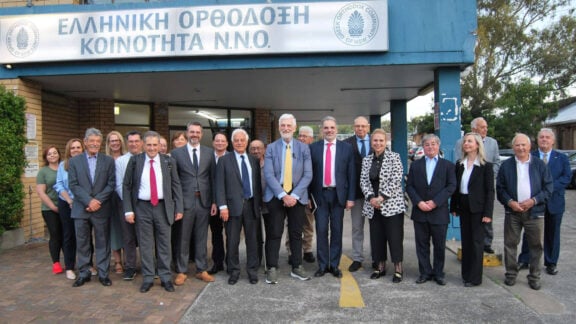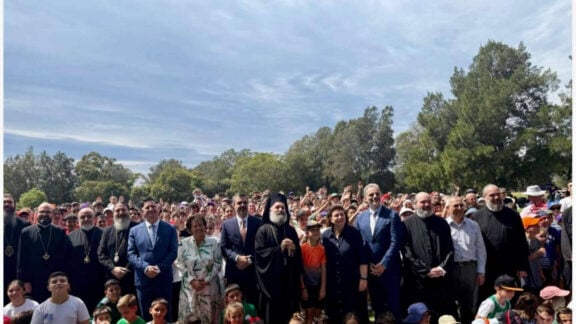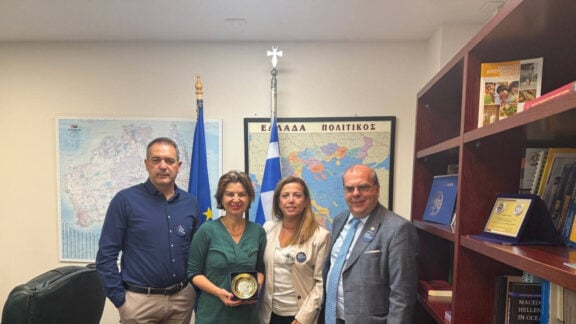The Astor Theatre is packed with filmgoers all eager for the return of the Greek Film Festival after two long years. You wouldn’t have thought that there were several state-wide flood warnings issued on the day; the inclement weather didn’t stop anyone from attending.
As the audience took their seats and enjoyed the food boxes from Bahari restaurant and the generously filled gift bags from the Greek Community of Melbourne, a sense of anticipation hung in the air. Everyone in attendance spoke with such a love for Greek culture and with an excitement to be back celebrating the Greek Film Festival.
The festival consists of 13 narrative films, 4 documentaries and a student film festival. Eftihia (2019), a narrative film directed by Angelos Frantzis, was chosen for the festival’s opening screening. The film tracks the life of Eftihia Papagianopoulos, a Greek lyricist whose words were sung by famous rebetika artists such as Vassilis Tsitsanis, Apostolos Kaldaras, and Manolis Chiotis.
Set in the aftermath of the Asia Minor catastrophe and its cultural and emotional impact, the film opens with haunting images of the period with an overlay of cries of suffering. Eftihia’s journey begins in Smyrna where destruction forces her to leave for Greece with her mother and two children.
From the moment she arrives in Greece, Eftihia abides life by her own rules as she constantly searches for fulfillment. Loss is around every corner and her repeated heartbreak leads to the creation of her most famous lyrics. Each sombre moment in her life is contrasted with a humorous scene. The balance between these emotions was seamless, leaving the audience alternating between tears of happiness and sadness in a matter of minutes.
Eftihia shifts between the present day, where an elderly Eftihia is being honoured for her career and life, and the story of her younger self from the moment she was forced to leave Smyrna. The celebration of her writing in the present aligns certain songs with moments from her past, allowing the captivated audience to see the life behind her lyrics. Even with this non-linear narrative, Eftihia’s character is constructed with such depth that there is no disconnect between the two versions of her.
There’s no question that women in film are underrepresented. Eftihia shines light on a woman who defined Greek music and culture and is an inspiration to us all. We saw her fight for a divorce in a time where women leaving their husbands was an unsupported act. Both actresses who portray Eftihia at different moments in her life—Kariofilia Karabeti and Katia Goulioni—excellently captured her feisty spirit, dedication to her craft, and defence of her family. Eftihia played a significant role in the popularity of rebetika singers and Frantzis gives Eftihia the credit she deserves in a male-dominated industry.
The film constantly reminds viewers of the value of the written word and creativity. The trauma from the war awakened Eftihia’s desire to experience life. She initially found that drive through acting and theatre before finding herself in her writing. While writing was often a means to make ends meet for Eftihia, the love and pain in her life emerged in her lyrics which remain relevant as they highlight such universal experiences. Eftihia’s lyrics showcase the richness of the Greek language, and unfortunately certain Greek phrases lose their cultural meaning in their simplification for the film’s English subtitle translations. While this is unavoidable in translation, it only emphasises the importance of maintaining Greek language in regions outside of Greece, to ensure that the delicate and powerful meanings are properly understood.
The live band playing rebetika songs as we left the cinema served as a reminder of Eftihia, a spirited woman who carved her own path and was the heart of the rebetiko movement in Greek culture.
Eftihia’s final screening is on Friday 28 October at Palace Cinema Como.
Tickets: www.greekfilmfestival.com.au/melbourne/films
*Christina Savopoulos is a Screen & English Theatre Studies student at the University of Melbourne.









